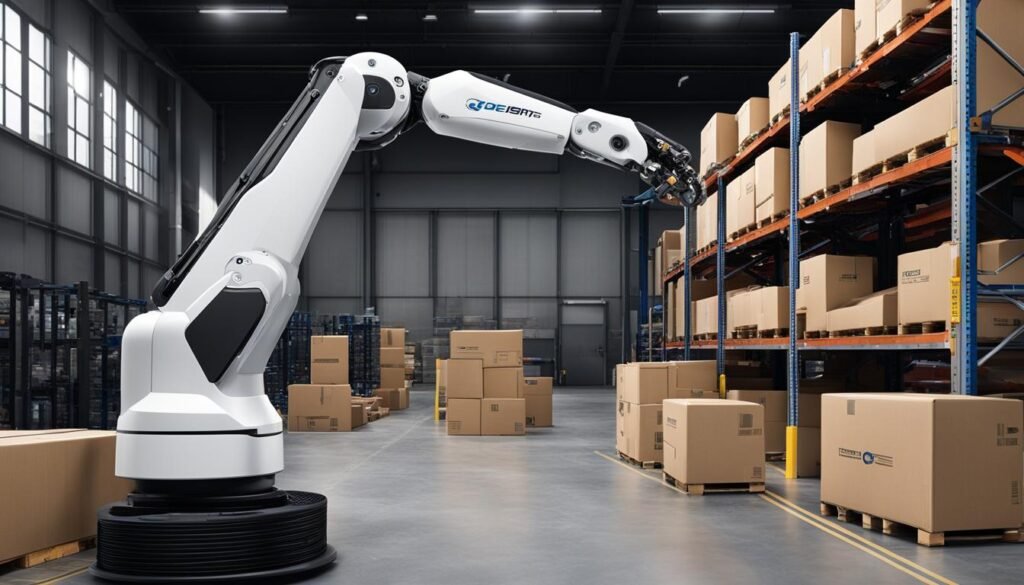In today’s fast-paced digital world, automation is crucial for e-commerce businesses to stay competitive. By implementing automation tools, you can streamline operations, save time, and enhance the customer experience. Automation encompasses various aspects such as marketing, inventory management, order processing, and customer service. It allows businesses to automate repetitive tasks, improve efficiency, and scale their operations effectively.
Key Takeaways:
- Automation is vital for e-commerce businesses to stay competitive.
- Implementing automation tools saves time and enhances the customer experience.
- Automation can be applied to marketing, inventory management, order processing, and customer service.
- Businesses can automate repetitive tasks, improve efficiency, and scale their operations effectively.
- By embracing automation, e-commerce businesses can achieve growth and success in a rapidly evolving digital landscape.
What is Automation E-commerce ?
Ecommerce automation is the implementation of software and technology to streamline various tasks and processes within an online store. By automating repetitive tasks such as inventory management, order processing, marketing campaigns, and customer service, businesses can save time, reduce errors, and scale their operations to accommodate higher volumes. Ecommerce automation plays a crucial role in streamlining workflows, improving efficiency, and driving business growth.
With the growth of online commerce, businesses are faced with the challenge of managing and scaling their operations effectively. Manual handling of these tasks not only consumes valuable time but also increases the risk of errors. By leveraging automation tools, businesses can focus on strategic initiatives while repetitive tasks are efficiently handled by technology.
Streamlining and automating key processes in an online store can significantly improve productivity and efficiency. For example, automating inventory management ensures accurate stock levels, reduces the risk of overstocking or out-of-stock situations, and simplifies the reordering process. Similarly, automating order processing allows for swift and accurate order fulfillment, ensuring customer satisfaction and timely delivery.
Marketing automation is another critical aspect of ecommerce automation. It enables businesses to automate email campaigns, social media posting, and ad management, ensuring targeted and timely communications with customers. By personalizing and automating marketing campaigns, businesses can enhance customer engagement, drive conversions, and increase revenue.
Customer service automation tools like chatbots help businesses provide instant assistance and support to customers, thereby improving response times and overall customer experience. Implementing automation tools not only saves time but also enables businesses to deliver a seamless and consistent customer experience.
Ecommerce automation is not just about saving time and reducing errors. It also enables businesses to scale their operations effectively. By automating repetitive tasks, businesses can handle higher volumes without the need for additional staff, providing a platform for sustainable growth and a competitive edge in the market.
Overall, ecommerce automation is a game-changer for businesses in the online sphere. It allows for efficient management of tasks and processes, saving time, improving accuracy, and providing a seamless customer experience. By embracing automation, businesses can streamline their operations, scale their business, and drive growth in the highly competitive ecommerce landscape.
Automating repetitive tasks with ecommerce automation tools helps save time and improve efficiency.
Types of Ecommerce Automation
There are several types of ecommerce automation that businesses can implement to streamline their operations and improve efficiency. Let’s take a look at some of the key types:
Ecommerce Marketing Automation
One important aspect of ecommerce automation is marketing. Ecommerce marketing automation involves automating email campaigns, social media posting, and ad management to improve targeting and engagement. By utilizing automation tools, businesses can deliver personalized messages, promote relevant products, and drive customer actions.
Email Automation
Email automation is another type of automation that focuses specifically on email communication. With email automation, businesses can send personalized emails based on customer triggers or actions. Whether it’s a welcome email for new subscribers, abandoned cart reminders, or personalized product recommendations, email automation ensures that customers receive relevant and timely emails, enhancing their overall experience.
Customer Service Automation
Efficient customer service is crucial for any ecommerce business. Customer service automation involves the use of chatbots and other tools to provide quick and efficient support to customers. Chatbots can handle common queries, provide instant assistance, and even initiate conversations with customers, ensuring a seamless customer service experience.
Inventory Management and Order Processing Automation
Automation can also be applied to inventory management and order processing to optimize operations and minimize human errors. By automating inventory management, businesses can maintain accurate stock levels, automate reorder processes, and prevent stockouts. Additionally, automation in order processing ensures efficient order capture, processing, and fulfillment, leading to faster order fulfillment and improved customer satisfaction.
By implementing these types of ecommerce automation, businesses can save time, enhance the customer experience, and improve overall efficiency in their operations.
Benefits of Ecommerce Automation

Ecommerce automation offers numerous benefits for businesses. By automating repetitive tasks, businesses can save time and allocate their workforce to more strategic and creative work, driving innovation and growth.
Improved Accuracy: Automation reduces the risk of human errors, improving overall accuracy and efficiency in ecommerce operations. With automation, businesses can ensure that orders are fulfilled correctly, inventory levels are accurately managed, and pricing is consistent across all channels.
Enhanced Customer Experience: With the ability to automate customer service interactions, businesses can provide faster response times and personalized assistance. Automation enables businesses to send relevant and targeted communications to customers, improving engagement and satisfaction.
Time and Resource Savings: Automation streamlines processes and eliminates the need for manual intervention, saving businesses both time and resources. By automating tasks such as inventory management, order processing, and marketing campaigns, businesses can operate more efficiently and focus on strategic initiatives.
Scalability: As businesses grow, their operations need to scale accordingly. Ecommerce automation allows businesses to handle increased order volumes without the need to hire additional staff or compromise on operational efficiency. Automation provides the flexibility and agility required to adapt to changing business needs.
Competitive Edge: In a highly competitive online marketplace, automation gives businesses a competitive edge by allowing them to operate more efficiently and effectively. By utilizing automation tools, businesses can optimize their operations, deliver a seamless customer experience, and stay ahead of the competition in terms of speed, accuracy, and responsiveness.
Implementing ecommerce automation is essential for businesses that want to save time, improve accuracy, enhance the customer experience, scale their operations, and gain a competitive edge in the dynamic world of ecommerce.
| Benefits | Description |
|---|---|
| Improved Accuracy | Reduces human errors and ensures accurate order fulfillment, inventory management, and pricing. |
| Enhanced Customer Experience | Enables faster response times, personalized communications, and better customer support. |
| Time and Resource Savings | Streamlines processes, eliminates manual tasks, and saves time and resources. |
| Scalability | Enables businesses to handle increased order volumes and grow without compromising efficiency. |
| Competitive Edge | Allows businesses to operate more efficiently and stay ahead of the competition in terms of speed and quality. |
Examples of Ecommerce Automation in Action

Ecommerce automation plays a vital role in streamlining operations and improving efficiency in online businesses. Let’s explore some examples of how automation can be implemented in different aspects of an ecommerce store.
1. Order Processing Automation
Order processing automation streamlines the entire fulfillment process, from capturing orders to shipping. By automating this process, businesses can eliminate manual data entry errors, expedite order fulfillment, and provide customers with real-time updates on their orders. This ensures a seamless and efficient experience for both buyers and sellers.
2. Inventory Management Automation
Inventory management automation enables businesses to accurately track stock levels and automate reorder processes. By implementing inventory management automation, businesses can avoid stockouts, reduce excess inventory, and improve order fulfillment efficiency. This ensures that customers can always find the products they need and helps businesses optimize their inventory investments.
3. Marketing Campaigns Automation
Automating marketing campaigns allows businesses to deliver targeted and personalized messages to their customers at scale. With automation, businesses can create and schedule email campaigns, segment their customer base for more accurate targeting, and even automate personalized product recommendations based on customer behavior. This not only saves time but also improves marketing effectiveness by delivering tailored messages that resonate with customers.
4. Customer Support Automation
Automation can also be applied to customer support through the use of chatbots and AI-powered tools. Chatbots can provide instant assistance and answer frequently asked questions, freeing up human support agents to handle more complex inquiries. This ensures that customers receive prompt and consistent support, leading to higher satisfaction rates and improved customer loyalty.
Incorporating these automation examples into an ecommerce store can significantly streamline operations, improve efficiency, and enhance the overall customer experience.
Implementing Ecommerce Automation Effectively

To achieve maximum results from ecommerce automation, businesses must adopt a strategic approach to implementation. Finding the right balance between automated processes and personalized human interactions is crucial for a successful transition. Customization plays a key role as automation tools should be tailored to fit the unique needs and processes of each business.
Implementing ecommerce automation effectively requires careful planning, comprehensive training, and ongoing evaluation. By following these steps, businesses can ensure that automation tools are utilized optimally, delivering the desired results.
Strategic Implementation for Success
Implementing ecommerce automation involves more than simply choosing the right tools. It requires a strategic outlook and attention to detail. Here are some essential steps for effective implementation:
- Evaluate current workflows and identify automation opportunities: Understand existing processes and identify repetitive tasks that can be automated for improved efficiency.
- Define goals and objectives: Clearly define the objectives of automation implementation and establish key performance indicators (KPIs) to measure success.
- Select the right automation tools: Choose ecommerce automation software that aligns with your business needs and integrates seamlessly with existing systems.
- Create a customized automation plan: Tailor automation workflows to meet your specific business requirements, considering factors such as order processing, inventory management, and customer support.
- Train employees: Provide comprehensive training to employees to ensure they understand how to use the automation tools effectively and efficiently.
- Monitor and evaluate performance: Continuously monitor and evaluate the performance of the automation tools to make necessary adjustments and optimize outcomes.
Finding the Balance Between Automation and a Human Touch
“Automation doesn’t replace the human touch; it enhances it.”
While automation offers numerous benefits, maintaining a human touch in customer interactions is essential for building trust and fostering meaningful connections. Achieving the right balance between automation and human touch is critical for customer satisfaction.
Ecommerce businesses should strategically decide which aspects of customer interactions can be automated without compromising the personal touch. For example, automated chatbots can handle simple customer queries, while more complex issues can be escalated to human representatives for personalized support. By intelligently combining automation with the human touch, businesses can provide efficient and personalized customer experiences.
Customization for Optimal Results
Customization is key to successful ecommerce automation implementation. Each business has its unique processes, and automation should be tailored to fit these requirements. By customizing automation workflows, businesses can optimize efficiency, reduce errors, and deliver exceptional customer experiences.
When customizing automation, consider factors such as branding, customer preferences, and the specific needs of your target market. This customization ensures that automated processes align with your business values and resonate with your customers, resulting in increased customer satisfaction and loyalty.
| Benefits of Effective Ecommerce Automation Implementation |
|---|
| Streamlined operations |
| Improved efficiency and productivity |
| Enhanced customer experience |
| Better scalability and growth potential |
| Reduced errors and improved accuracy |
Key Ecommerce Automation Tools

When it comes to ecommerce automation, there are several essential tools that can help businesses streamline operations and enhance the customer experience. These tools offer a range of features designed to automate various aspects of an online store, from inventory management to marketing campaigns. Here are some key ecommerce automation tools:
Shopify
One of the most popular ecommerce platforms, Shopify offers a comprehensive suite of automation features. With Shopify, you can automate inventory management, order processing, and marketing campaigns, saving time and improving efficiency. Its user-friendly interface and customizable templates make it a favorite among online retailers.
Klaviyo
Klaviyo is a specialized email marketing automation tool that helps businesses create personalized email campaigns. With Klaviyo, you can automate email sequences based on customer triggers or actions, ensuring that your marketing efforts are targeted and tailored to individual customers.
DynamicPricing.ai
DynamicPricing.ai is an AI-powered tool specifically designed for dynamic pricing optimization. By leveraging advanced algorithms and data analysis, this tool enables businesses to automatically adjust prices based on market demand and competition, ensuring optimal pricing strategies that maximize profitability.
CartStack
CartStack is an ecommerce automation tool that focuses on recovering abandoned carts. It sends automated email reminders and notifications to customers who have left items in their carts, encouraging them to complete their purchase. By re-engaging with potential customers, CartStack helps businesses recover lost revenue and increase conversions.
Bodt
Bodt is an AI-powered customer support tool that provides automated assistance to online shoppers. It utilizes chatbot technology to handle common customer queries and provide instant support. Bodt’s intuitive interface and natural language processing capabilities ensure that customers receive prompt and helpful responses, improving the overall customer experience.
These ecommerce automation tools offer a range of features to help businesses automate various aspects of their online operations. From inventory management to marketing campaigns and customer support, these tools can streamline processes, save time, and enhance the customer experience.
The Power of AI in Ecommerce Automation

When it comes to ecommerce automation, AI is a game-changer. AI-powered tools have the ability to analyze vast amounts of data, identify patterns, and make intelligent decisions based on this information. This advanced technology enables businesses to automate processes and take their customer experience to new heights.
By leveraging AI in ecommerce automation, businesses can provide personalized recommendations to their customers. This means that instead of bombarding shoppers with generic suggestions, AI algorithms can analyze their browsing and purchase history to offer relevant and tailored product recommendations. This level of personalization not only enhances the customer experience but also increases the likelihood of conversions and repeat purchases.
Furthermore, AI can greatly improve decision-making within an ecommerce business. With the power of AI, businesses can optimize pricing strategies by analyzing market trends and customer behavior. This data-driven approach allows companies to make informed pricing decisions that maximize profitability while remaining competitive in the market.
Ultimately, the integration of AI in ecommerce automation results in an enhanced customer experience. By automating processes and leveraging AI algorithms, businesses can create a seamless and personalized shopping journey for their customers. This leads to increased customer satisfaction, loyalty, and ultimately, business growth.
Let’s take a closer look at the impact of AI in ecommerce automation:
“AI-powered tools have revolutionized the way we approach ecommerce automation. By analyzing vast amounts of data, we can now offer personalized recommendations and make data-driven decisions, leading to improved customer experiences and increased business success.”
Benefits of AI in Ecommerce Automation
Implementing AI in ecommerce automation offers a wide range of benefits for businesses:
- Personalized recommendations: AI algorithms can analyze customer data to provide personalized product recommendations, enhancing the customer shopping experience.
- Improved decision-making: AI-powered tools can analyze market trends and customer behavior, helping businesses make data-driven decisions for pricing and other strategic initiatives.
- Enhanced customer experience: By automating processes and providing personalized recommendations, businesses can deliver a customized and seamless shopping journey, increasing customer satisfaction and loyalty.
- Increased efficiency and productivity: AI automation can streamline workflows and reduce manual efforts, allowing employees to focus on higher-value tasks and improving overall operational efficiency.
- Competitive advantage: By embracing AI in ecommerce automation, businesses can differentiate themselves from the competition and stay ahead in the rapidly evolving online marketplace.
The Future of Ecommerce Automation with AI
The future of ecommerce automation lies in the continued advancement of AI technology. As AI algorithms become more sophisticated and capable of processing larger data sets, the possibilities for automation and personalization will continue to expand.
With ongoing developments in machine learning and natural language processing, AI-powered chatbots will become even more intelligent, providing customers with seamless and efficient support. Voice assistants powered by AI will also play a significant role in ecommerce automation, enabling customers to navigate online stores and make purchases through voice commands.
As AI continues to evolve, businesses will have more opportunities to automate tasks, optimize processes, and deliver exceptional customer experiences. Embracing AI in ecommerce automation is no longer a luxury but a necessity for businesses looking to thrive in the digital age.
Ecommerce Automation and Business Success Stories
Ecommerce giants like Amazon and Sephora have successfully implemented ecommerce automation to streamline their operations and drive business growth. These success stories highlight the transformative impact of ecommerce automation on business success. Let’s take a closer look at how Amazon and Sephora have leveraged automation in their respective areas ecommerce automation works e-commerce platform automation in ecommerce automation is the use benefits of automation automation solutions ecommerce success automation platforms automation saves automation saves e-commerce automation is the use e-commerce automation is the use.
Amazon: Streamlining Order Processing and Logistics
When it comes to ecommerce automation, Amazon is a pioneer. They have implemented robotics and automated systems in their fulfillment centers, optimizing order processing and logistics. These technologies have significantly increased efficiency, reduced errors, and improved the overall customer experience.
Sephora: Personalized Marketing Efforts
Sephora, a leading beauty retailer, has embraced ecommerce automation to enhance their marketing efforts. They have leveraged automation tools to create personalized email campaigns and targeted promotions. By delivering relevant and engaging content to their customers, Sephora has been able to drive sales and foster long-term customer relationships.
| Business | Automation Implementation | Benefits |
|---|---|---|
| Amazon | Robotics and automated systems in fulfillment centers | Streamlined order processing, improved logistics, enhanced customer experience |
| Sephora | Personalized email campaigns and targeted promotions | Increased sales, improved customer engagement and loyalty |
These success stories serve as prime examples of how ecommerce automation can revolutionize business operations and drive growth. By automating key processes, businesses can save time, optimize efficiency, and enhance the customer experience, ultimately leading to improved bottom lines.
Also Read : Understanding The Dynamics Of Ecommerce Or E-Commerce Today
Conclusion
Ecommerce automation is a game-changer for businesses aiming to achieve operational efficiency and deliver exceptional customer experiences. By leveraging automation tools, businesses can eliminate manual errors, save valuable time, and scale their operations seamlessly. The implementation of ecommerce automation requires careful planning and customization to strike the right balance between automation and maintaining a human touch. Success stories from renowned industry leaders like Amazon and Sephora highlight the transformative impact of ecommerce automation on business success and growth.
The benefits of ecommerce automation are manifold. By automating repetitive tasks and streamlining workflows, businesses can optimize their operations, improve efficiency, and focus on strategic initiatives. Automation tools enable businesses to enhance customer experiences through personalized marketing campaigns, targeted promotions, and efficient customer service. Additionally, automation allows businesses to scale their operations effectively without the need for additional staff, giving them a competitive edge in the ever-evolving ecommerce landscape.
In conclusion, embracing ecommerce automation is crucial for businesses aiming to thrive in the digital marketplace. By leveraging automation’s benefits, implementing a strategic approach, and drawing inspiration from success stories, businesses can streamline their operations, enhance customer experiences, and achieve sustainable growth. In today’s competitive landscape, automation is a catalyst for success, allowing businesses to stay ahead and seize the opportunities presented by the ecommerce industry.
FAQs
Q: What is e-commerce automation?
A: E-commerce automation refers to the use of software and technology to streamline and automate repetitive tasks and processes in an online store, such as order fulfillment, inventory management, and marketing campaigns.
Q: How can automation help my e-commerce business?
A: Automation can help your e-commerce business by saving time and energy, reducing human errors, improving operational efficiency, and enabling you to focus on strategic tasks that drive growth and innovation.
Q: What are the benefits of e-commerce automation?
A: The benefits of e-commerce automation include increased productivity, cost savings, faster order processing, improved customer experience, better inventory management, and the ability to scale your business without adding more manual workload.
Q: How does automation work in e-commerce?
A: Automation in e-commerce works by using software, algorithms, and integrations to handle repetitive tasks, such as sending automated emails, updating inventory levels, processing orders, and analyzing customer data without continuous human intervention.
Q: What are some examples of e-commerce automation tools?
A: Some examples of e-commerce automation tools include inventory management systems, email marketing platforms with automation capabilities, order fulfillment software, customer relationship management (CRM) solutions, and workflow automation software.
Q: How can I automate my e-commerce workflow?
A: You can automate your e-commerce workflow by identifying repetitive tasks, selecting the right automation tools or software for your specific needs, setting up rules and triggers, and continuously monitoring and optimizing the automated processes for maximum efficiency.
Q: What role does AI play in e-commerce automation?
A: AI (Artificial Intelligence) plays a significant role in e-commerce automation by enabling predictive analytics, personalized product recommendations, chatbots for customer service, dynamic pricing optimization, and advanced data analysis to enhance decision-making processes.
Q: What are some e-commerce automation best practices?
A: Some e-commerce automation best practices include starting with small, manageable automation tasks, testing and measuring the impact of automation, ensuring seamless integration between different tools, and regularly updating your automation processes to align with changing business needs.
Q: How does e-commerce automation contribute to the success of e-commerce companies?
A: E-commerce automation contributes to the success of e-commerce companies by enabling them to operate more efficiently, offer a better customer experience, adapt to changing market demands faster, and allocate resources towards innovation and growth rather than repetitive operational tasks.
Q: When it comes to e-commerce automation, how can I save time and energy?
A: E-commerce automation can help you save time and energy by automating tasks such as order processing, inventory management, customer communication, and marketing efforts, allowing you to focus on strategic decision-making and business development.
Source Links
- https://www.sparq.ai/blogs/ecommerce-automation-guide
- https://blog.getmanifest.ai/ecommerce-tools/
- https://www.helpscout.com/blog/ecommerce-automation/





